20+ Years Experience
Specialist Resin Flooring Installers

Enquire Today For A Free No Obligation Quote
Crunching the Numbers: Understanding the Factors Influencing Epoxy Resin Flooring Costs
When it comes to epoxy resin flooring costs, understanding the factors that influence them is essential. Different elements come into play when determining the cost of epoxy resin flooring, and being aware of these factors can help you make informed decisions. Here are some key considerations:
1. Type and Quality of Epoxy Resin Material: The type and quality of the epoxy resin material used have a significant impact on the overall cost. Higher-quality materials tend to be more expensive but offer better durability and longevity.
2. Size of the Area to be Covered: The size of the area to be covered with epoxy resin flooring affects the cost. Larger areas require more materials and labor, resulting in higher costs.
3. Surface Preparation Requirements: The condition of the existing floor and the necessary surface preparation can impact the cost. If extensive repairs or preparation work is needed, it can add to the overall expenses.
4. Complexity of the Design and Pattern: Intricate designs and patterns can increase the cost of epoxy resin flooring. More intricate designs require additional time and effort, which can translate to higher costs.
5. Additional Features and Finishes: Additional features such as anti-slip coatings or decorative finishes can add to the overall cost of epoxy resin flooring. These enhancements provide additional functionality or aesthetic appeal but come at an extra expense.
Calculating the Costs of Epoxy Resin Flooring involves considering various aspects:
1. Cost per Square Meter or Square Foot: The cost of epoxy resin flooring is often calculated based on the area to be covered. It is typically quoted per square meter or square foot.
2. Labor and Installation Costs: Labor and installation costs are an essential part of the overall expenses. Skilled professionals are needed to ensure the correct application of epoxy resin flooring.
3. Cost of Surface Preparation: Surface preparation, including repairs, cleaning, and priming, adds to the total cost. Proper surface preparation ensures the longevity and performance of the epoxy resin flooring.
4. Cost of Additional Features and Finishes: If you opt for additional features or finishes, such as decorative flakes or metallic effects, these will have their own associated costs.
Various factors can influence the overall cost of epoxy resin flooring:
1. Location and Accessibility: The location and accessibility of the site can affect costs due to logistical considerations and transportation expenses.
2. Market Demand and Competition: Market demand and competition play a role in pricing. In areas with higher demand, costs may be higher due to increased competition among contractors.
3. Contractor Experience and Reputation: Contractors with more experience and a good reputation may charge higher rates for their expertise. However, investing in skilled professionals can ensure quality results.
4. Seasonal Factors: Seasonal factors, such as weather conditions or construction trends in certain seasons, can impact material availability and pricing.
To effectively manage epoxy resin flooring costs, consider the following tips:
1. Get Multiple Quotes and Compare: Obtain quotes from different contractors to compare pricing and services offered. This allows you to find the most suitable option for your budget.
2. Clarify Inclusions and Exclusions: Ensure that you have a clear understanding of what is included in the quoted price. Clarify any additional costs or exclusions to avoid unexpected expenses.
3. Consider Long-Term Durability and Maintenance: While upfront costs are important, consider the long-term durability of the epoxy resin flooring. Investing in higher-quality materials may result in better durability and lower maintenance costs over time.
4. Plan for Future Changes or Upgrades: If you anticipate future changes or upgrades, discuss these with the contractor during the initial planning stages. Planning ahead can help minimize future expenses.
By understanding the factors influencing epoxy resin flooring costs and implementing these tips, you can make informed decisions and manage your budget effectively.
Understanding the Factors Influencing Epoxy Resin Flooring Costs
When it comes to epoxy resin flooring, it is important to understand what determines the cost. In this section, we will take a closer look at what influences the pricing of epoxy resin flooring. The factors include the type and quality of the epoxy resin material, the size of the area that needs coverage, surface preparation requirements, the complexity of the design and pattern, and additional features and finishes. By exploring these key elements, we can gain a better understanding of the expenses associated with epoxy resin flooring.
The cost of epoxy resin flooring is influenced by the type and quality of the epoxy resin material used. The durability, performance, and overall quality of different types of epoxy resin materials vary. Higher-quality epoxy resin materials tend to be more expensive because of their superior properties and longevity. The pricing may also be affected by the specific type of epoxy resin, such as solvent-based or water-based. It is crucial to evaluate the type and quality of the epoxy resin material to ensure that it aligns with your project requirements and budget.
The size of the area to be covered is an important factor in determining the cost of an epoxy resin flooring project. The cost of materials and labour increases as the size of the area increases. To understand the impact of area size on costs, refer to the following table:
| Area Size (in square feet) | Cost Estimate |
|---|---|
| 500 | £2,500 |
| 1,000 | £5,000 |
| 2,000 | £10,000 |
| 5,000 | £25,000 |
| 10,000 | £50,000 |
For instance, John wanted to install epoxy resin flooring in his 1,500 square feet garage. He received quotes from different contractors and noticed significant cost variations based on the size. As a result, he had to adjust his budget and plan accordingly to cover the expenses.
To ensure the proper installation of epoxy resin flooring, it is essential to prepare the surface adequately. The following surface preparation requirements should be met:
Pro-tip: Adequate surface preparation is crucial for achieving better adhesion and longevity of the epoxy resin flooring. It is also advisable to seek professional advice to ensure that the surface is appropriately prepared for the installation process.
The complexity of the design and pattern is a crucial factor in determining the cost of epoxy resin flooring. This factor takes into account the intricacy and uniqueness of the design or pattern that needs to be created on the floor surface. Complex designs and patterns require more time, effort, and expertise to achieve, resulting in higher costs. Examples of complex designs include geometric patterns, intricate logos, or custom artwork. The complexity of the design and pattern directly impacts the labour and installation costs, as well as the time required to complete the project. It is essential to discuss the design and pattern requirements with the contractor to accurately estimate the cost and ensure that the final result meets your expectations.
When considering epoxy resin flooring, it is important to take into account various additional features and finishes that can impact the cost and overall appearance of the flooring.
Calculating the costs of epoxy resin flooring is an important aspect to consider when planning a project. This section will delve into the specific details that affect the overall expenses. From the price per square metre or square foot to labour and installation fees, we will examine the different factors. Additionally, we will explore the influence of surface preparation, as well as the cost implications of additional features and finishes. Prepare yourself to analyse figures and acquire a better comprehension of the factors involved in estimating epoxy resin flooring costs.
When considering the cost of epoxy resin flooring, one important factor to take into account is the cost per square metre or square foot.
This cost can vary depending on various factors such as the type and quality of the epoxy resin material, the size of the area to be covered, the surface preparation requirements, the complexity of the design and pattern, and any additional features and finishes. To understand this better, here is a breakdown of the factors influencing epoxy resin flooring costs in table form:
| Factors | Details |
|---|---|
| Type and Quality of Epoxy Resin Material | Higher quality materials may have a higher cost per square metre or square foot. |
| Size of the Area to be Covered | Larger areas generally have a lower cost per square metre or square foot. |
| Surface Preparation Requirements | Complex surface preparation may increase the cost per square metre or square foot. |
| Complexity of the Design and Pattern | Intricate designs or patterns may result in a higher cost per square metre or square foot. |
| Additional Features and Finishes | Additional features or finishes, such as anti-slip coatings, can impact the cost per square metre or square foot. |
To manage epoxy resin flooring costs, it is recommended to get multiple quotes and compare them, clarify inclusions and exclusions, consider long-term durability and maintenance, and plan for any future changes or upgrades.
The cost of labour and installation is an important factor to consider when determining the overall cost of epoxy resin flooring. These costs include hiring professional installers who have the necessary expertise and skills for proper installation. Other expenses may include surface preparation, such as cleaning, repairing, or levelling the substrate before applying the epoxy resin. The complexity of the chosen design and pattern for the flooring can also impact the labour and installation costs. It is crucial to obtain multiple quotes from different contractors and clarify all inclusions and exclusions to effectively manage these expenses.
Preparing the surface before applying epoxy resin flooring is a crucial step that can have a significant impact on the overall cost. The cost of surface preparation depends on various factors, including the area’s size, the condition of the existing surface, and the desired end result. Here is a breakdown of the cost considerations for surface preparation:
| 1. Removal of existing flooring | Includes the cost of removing any existing flooring materials, such as tiles or carpet. |
| 2. Repairing and patching | Involves fixing any cracks, holes, or uneven areas on the surface. |
| 3. Cleaning and degreasing | Ensures a clean and oil-free surface, improving the adhesion of the epoxy resin. |
| 4. Shot blasting or grinding | Creates a rough profile on the surface for better bonding with the epoxy resin. |
| 5. Moisture testing and mitigation | Testing for moisture content and applying moisture barriers if necessary. |
By considering the cost of surface preparation, you can obtain a more accurate estimate of the total cost of your epoxy resin flooring project. Remember to consult professionals to determine the specific requirements for your surface.
Throughout history, surface preparation has always been essential to achieve durable and long-lasting flooring. From ancient civilizations using clay to modern advancements in epoxy resin flooring, proper surface preparation has been crucial in ensuring successful installations. Today, with advanced techniques and materials, surface preparation plays a vital role in achieving functional, aesthetically pleasing, and durable flooring solutions. Its importance continues to be recognized and valued in the field of construction and design.
When considering the cost of epoxy resin flooring, the cost of additional features and finishes can have a significant impact. These additional factors can include:
To manage the cost of additional features and finishes:
Curious about what drives the costs of epoxy resin flooring? Let’s explore the factors that influence these expenses. From the location and accessibility of the site to market demand and competition, contractor experience, reputation, and even seasonal factors, all play a role in determining the price tag of this versatile flooring option. So, get ready to dive into the complexities behind epoxy resin flooring costs and gain a deeper understanding of the key elements involved!
Location and accessibility are key factors that influence the cost of epoxy resin flooring. These factors include:
Market demand and competition are key factors that determine the cost of epoxy resin flooring. The relationship between market demand, competition, and pricing is illustrated in the table below:
| Market Demand | Competition | Pricing |
|---|---|---|
| High | Low | Higher prices due to increased demand and limited options |
| High | High | Competitive pricing as multiple suppliers compete for customers |
| Low | Low | Lower prices due to reduced demand and fewer options |
| Low | High | Prices may vary depending on the supplier’s reputation and marketing strategies |
In a real-life scenario, a company experienced a surge in demand for epoxy resin flooring due to its durability and aesthetic appeal. As more suppliers entered the market, competition increased, resulting in lower prices and more options for customers. The company adapted by offering unique finishes and excellent customer service, setting itself apart from the competition. Despite the market dynamics, the company continued to thrive by consistently delivering high-quality flooring solutions at competitive prices.
When it comes to epoxy resin flooring, the experience and reputation of the contractor are crucial in determining the outcome and overall cost. Skilled and experienced contractors are more likely to deliver high-quality workmanship, ensuring proper installation of the flooring and addressing any potential issues. Reputable contractors often have access to a wider range of materials and resources, offering more options and customized solutions. While hiring an experienced contractor may come at a higher price, it is worth the investment to ensure a durable and aesthetically pleasing epoxy resin flooring.
Pro-tip: Prioritise experience and reputation when selecting a contractor for your epoxy resin flooring project as it can greatly impact the final result.
Seasonal factors can have a significant impact on the cost and duration of epoxy resin flooring projects. The following table illustrates how different seasons can affect the installation process:
| Season | Impact |
|---|---|
| Winter | Cold temperatures can slow down the curing process, which may extend the project timeline. |
| Spring | Increased humidity levels may require additional moisture barrier installation. |
| Summer | High temperatures can speed up curing, reducing the project time, but precautions should be taken to prevent overheating. |
| Autumn | Moderate weather conditions make it an ideal time for epoxy resin flooring installations. |
These seasonal considerations should be taken into account when planning and budgeting for epoxy resin flooring projects.
When it comes to managing epoxy resin flooring costs, there are some valuable tips to keep in mind. From obtaining multiple quotes and comparing them to clarifying what is included and excluded, these tips can assist you in making informed decisions. Taking into account the long-term durability and maintenance requirements of your flooring, as well as planning for future changes or upgrades, can have a significant impact on managing costs effectively. Stay tuned as we delve into these tips in further detail!
When considering epoxy resin flooring for your project, it is important to get multiple quotes and compare them. This will help you make an informed decision. Here are some reasons why:
When determining the cost of epoxy resin flooring, it is important to clarify the inclusions and exclusions offered by the contractor. This will help to avoid any misunderstandings or unexpected expenses during the project. Inclusions may encompass the cost of materials, labour, and surface preparation, while exclusions may involve additional features and finishes. By fully understanding what is included and excluded in the contract, you can accurately estimate and manage the overall cost of the epoxy resin flooring installation. Effective communication with the contractor is essential to ensure transparency and prevent any financial surprises.
When considering epoxy resin flooring, it is important to take into account the long-term durability and maintenance requirements of the flooring.
Planning for future changes or upgrades is essential when investing in epoxy resin flooring. To ensure flexibility and cost-effectiveness in the long run, consider the following suggestions:
By planning ahead, you can save both time and money when making changes or upgrades to your epoxy resin flooring in the future.
There are several factors that can influence the cost of epoxy resin flooring, including:
The size of the flooring area can affect epoxy flooring costs as larger rooms require more materials, resulting in a higher price. The equation to calculate the area is width multiplied by length. Smaller spaces typically require less resin and have lower installation costs.
The quality of the sub-base is crucial as a poor sub-base can impact the durability and lifespan of the epoxy flooring. Preparing the sub-base by ensuring it is level and smooth, removing debris, applying epoxy primer, and installing an underlayment if necessary can increase the project’s cost.
Sealing coats are necessary to protect the epoxy flooring from wear and tear, and the type of sealant used can impact the overall cost. Water-based polyurethane is an example of a sealing coat that can be applied.
The geographical location of the installation can affect the cost of epoxy flooring. Longer travel distances or overnight accommodations may increase expenses. It is important to consider the location when calculating project costs.
To get a fast and precise quote for epoxy resin flooring costs, it is recommended to contact a reputable resin flooring specialist. They can provide a quote based on your specific requirements, taking into account factors such as the size of the area, resin type, and desired finishes.
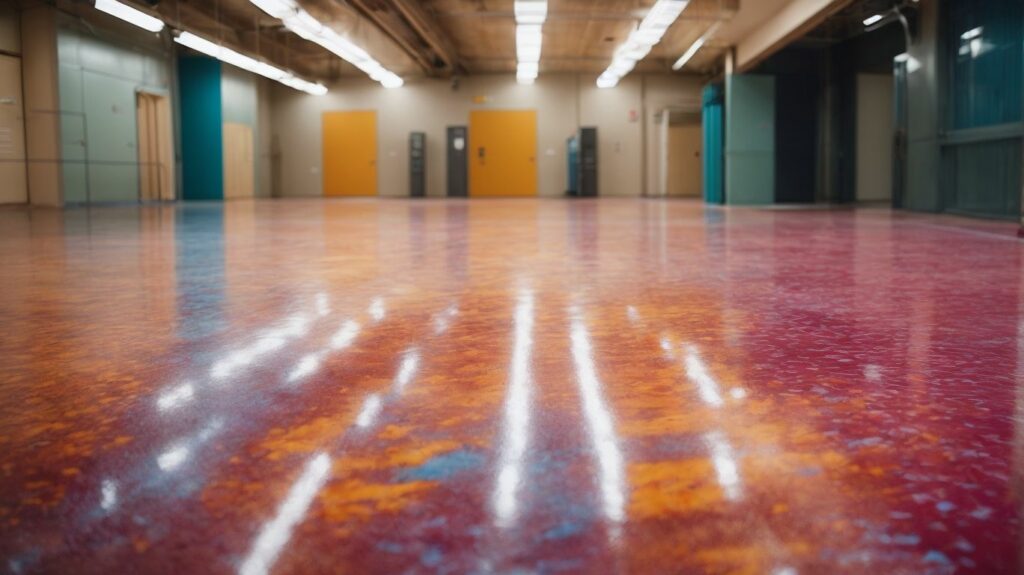





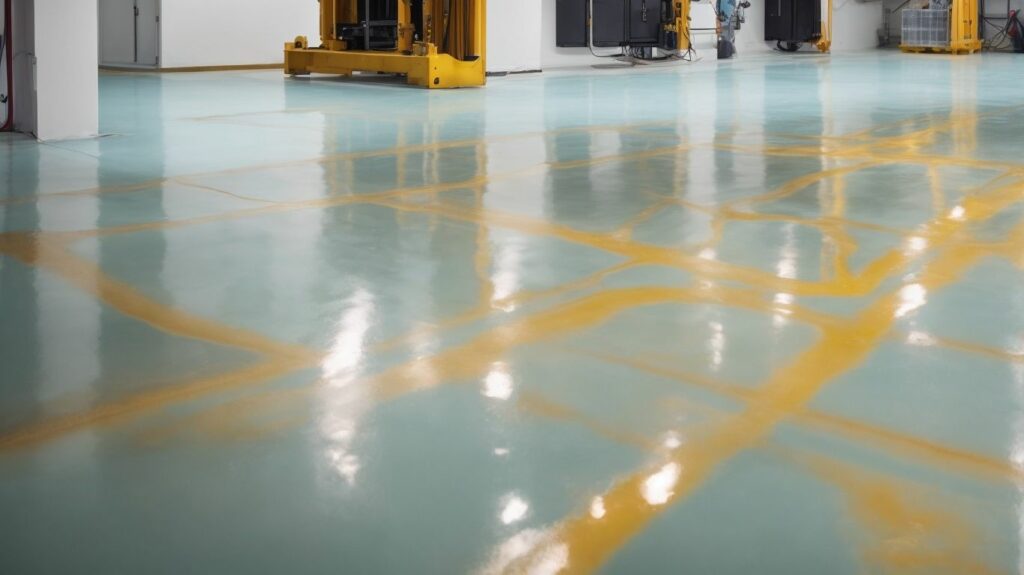





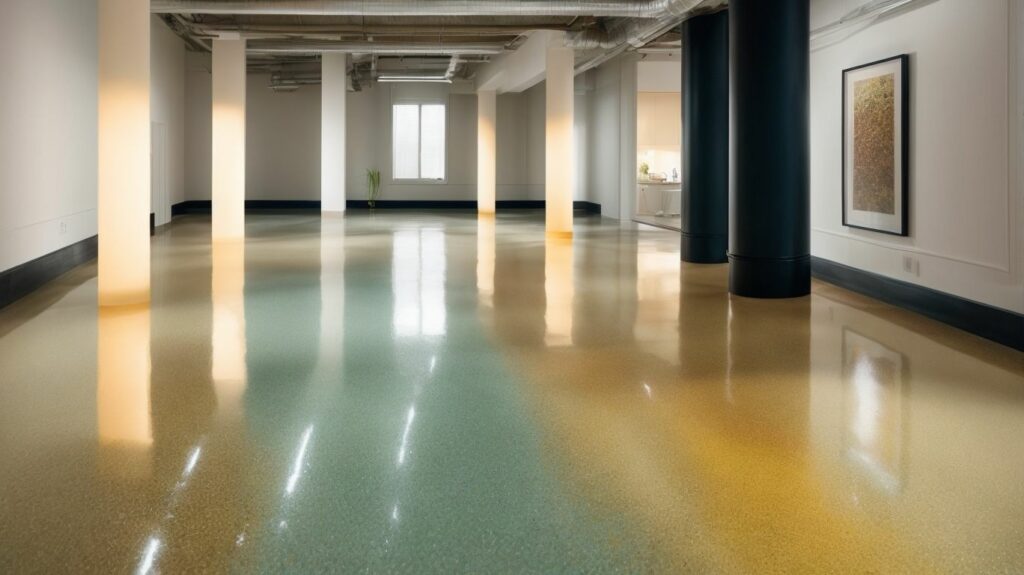

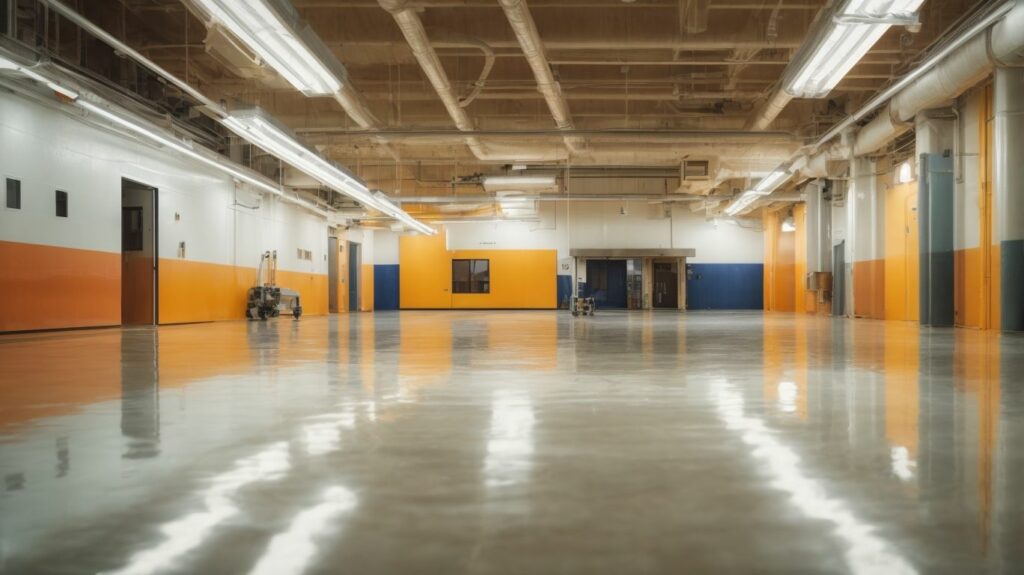




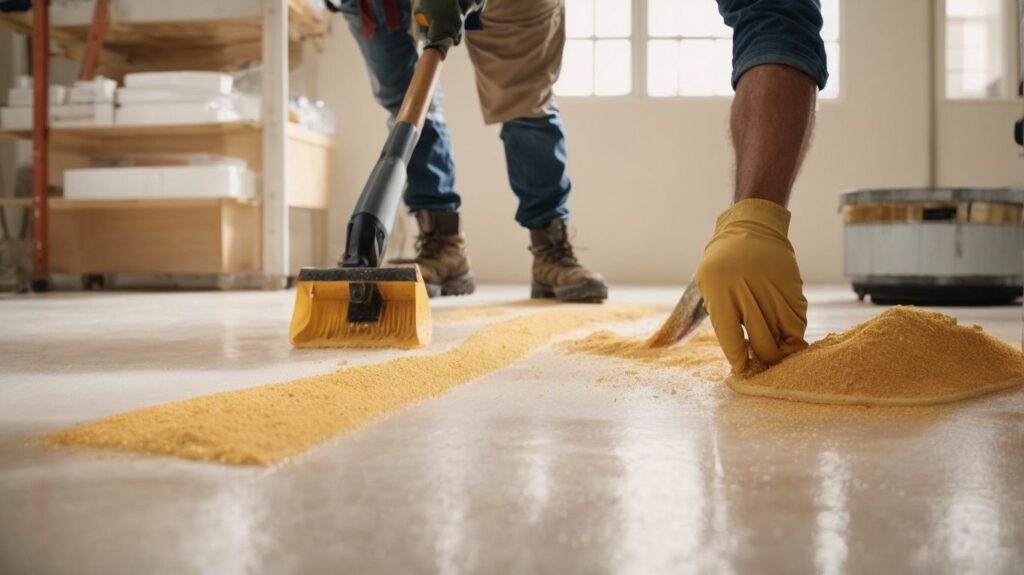

We Aim To Reply To All Enquiries With-in 24-Hours